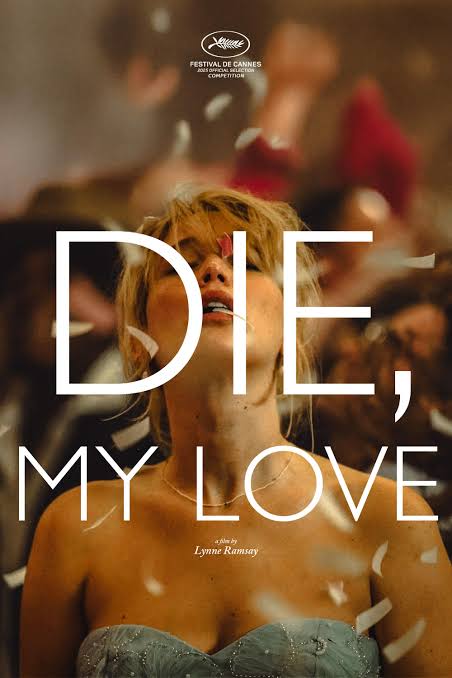Read the full review of Die, My Love (2025), a haunting psychological drama starring Jennifer Lawrence. Directed by Lynne Ramsay, the film explores postpartum psychosis with raw emotion and powerful performances.

Directed by: Lynne Ramsay
Starring: Jennifer Lawrence, Robert Pattinson, LaKeith Stanfield, Sissy Spacek, Nick Nolte
Screenplay by: Lynne Ramsay, Enda Walsh, Alice Birch
Based on the novel by: Ariana Harwicz
Running Time: 118 minutes
Release Date: May 17, 2025 (Cannes Film Festival)
Language: English
Genre: Psychological Drama
Introduction
Die, My Love is a bold, unsettling, and emotionally visceral psychological drama directed by Lynne Ramsay, returning to the screen after You Were Never Really Here. Adapted from Ariana Harwicz’s 2017 novel, the film navigates the agonizing descent of a new mother into the depths of postpartum depression and psychosis, capturing a rarely portrayed, raw emotional terrain.
Led by Jennifer Lawrence, who also produces the film under her banner Excellent Cadaver, Die, My Love is a courageous exploration of female rage, mental illness, and the suffocating constraints of domestic life. The result is a haunting, powerful film that will linger long after the credits roll.
Plot Summary (No Spoilers)
Set in rural America, the story follows an unnamed woman (Jennifer Lawrence), a new mother who is trapped in a state of emotional and psychological crisis. Isolated in a remote farmhouse with her baby and emotionally distant husband (Robert Pattinson), she struggles to connect with her child, her partner, and reality itself.
As the days pass, her mind begins to unravel. Her internal monologue grows darker and more chaotic, shifting between despair, anger, and surreal fantasies. The line between reality and delusion becomes increasingly blurred, plunging the viewer into the depths of her psychosis. Flashbacks, hallucinations, and dreamlike interludes dominate the narrative, immersing us in her fractured psyche.
This is not a film about a woman who needs saving — it’s about one who’s losing herself entirely in silence and suffocation.
Performances
Jennifer Lawrence
Lawrence delivers one of the most fearless and intense performances of her career. She embodies a woman on the brink with such brutal honesty and complexity that it’s hard to look away. Her eyes carry the burden of guilt, rage, and confusion, and her physical performance — often wordless — is haunting. Expect major awards buzz for this one.
Robert Pattinson
As the detached husband trying — and often failing — to connect, Pattinson gives a restrained yet deeply affecting performance. He doesn’t speak much, but his emotional distance and helplessness are palpable.
Supporting Cast
- LaKeith Stanfield plays a mysterious man who enters the protagonist’s life with ambiguous intentions, serving as a mirror to her desires and disintegration.
- Sissy Spacek and Nick Nolte, as the protagonist’s parents, bring gravitas and a tragic familiarity, adding layers to her emotional history.
Direction & Screenplay
Lynne Ramsay is known for her uncompromising, poetic visual storytelling, and she brings that same intensity to Die, My Love. Ramsay doesn’t just tell the story — she plunges the viewer into the protagonist’s inner world. The film’s structure is fragmented, non-linear, and at times surreal, mirroring the protagonist’s mental state.
The screenplay, co-written with Enda Walsh and Alice Birch, remains faithful to the spirit of Harwicz’s novel, particularly its stream-of-consciousness narration and brutal emotional honesty. Dialogue is minimal; much of the story unfolds visually or through voiceover, which gives the film an almost literary rhythm.
Cinematography & Editing
Seamus McGarvey’s cinematography is stunning and deeply atmospheric. The use of shadow, natural light, and color grading creates a mood that is both intimate and nightmarish. The rural landscape is both idyllic and isolating — a beautiful prison.
Toni Froschhammer’s editing is equally masterful. The quick cuts, disorienting transitions, and surreal interludes heighten the feeling of instability. Time seems to collapse, reflecting the protagonist’s sense of disorientation.
Music & Sound Design
There is minimal use of score, but when music does appear, it’s jarring and emotionally charged. The sound design plays a major role in conveying the psychological intensity — from the subtle cries of a baby to the deafening silence of isolation, everything is calibrated to immerse us fully in the character’s experience.
Themes & Symbolism
Die, My Love tackles:
- Postpartum depression in its most terrifying, unfiltered form
- Female rage and repression within patriarchal domestic life
- Mental illness as an internal war with no clear enemy
- Isolation and identity — particularly the loss of self in motherhood
Symbolism is rich throughout — animals, dreams, and the landscape are all used to externalize the protagonist’s inner turmoil.
What Works
- Jennifer Lawrence’s tour-de-force performance
- Visually poetic, emotionally devastating direction
- Immersive sound and editing that reflect psychosis
- Honest and unflinching portrayal of postpartum mental health
What Doesn’t Work
- The fragmented narrative may alienate some viewers
- Intense subject matter and tone could be emotionally overwhelming
- Lacks conventional pacing or resolution — this is more a psychological portrait than a plot-driven film
Verdict
Die, My Love is not an easy film to watch, but it is a necessary one. Anchored by a searing performance from Jennifer Lawrence and visionary direction from Lynne Ramsay, this is a film that speaks directly to the silent struggles of motherhood, mental illness, and female autonomy. Uncompromising and unforgettable, it’s a masterwork of psychological cinema.
Best Movie Review(BMR) Rating: 9/10